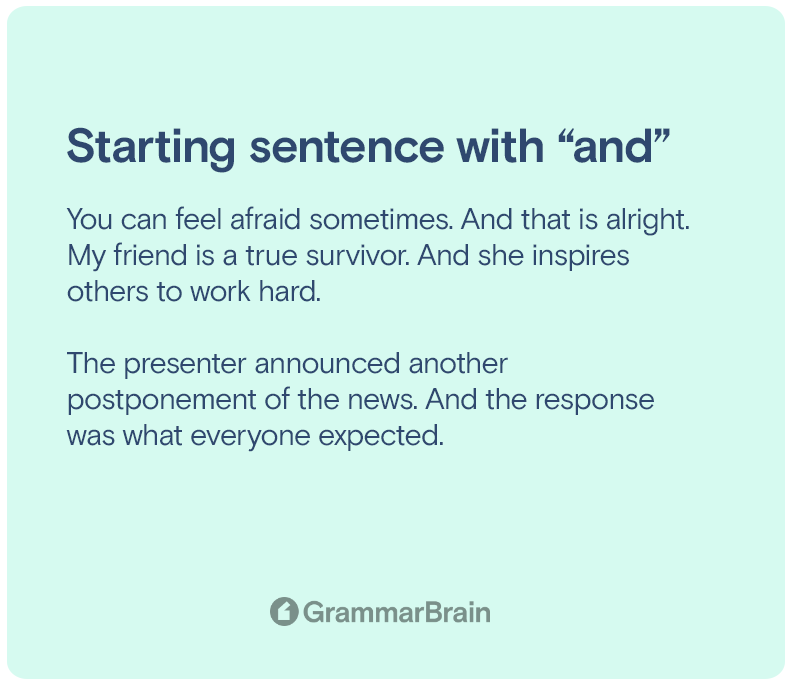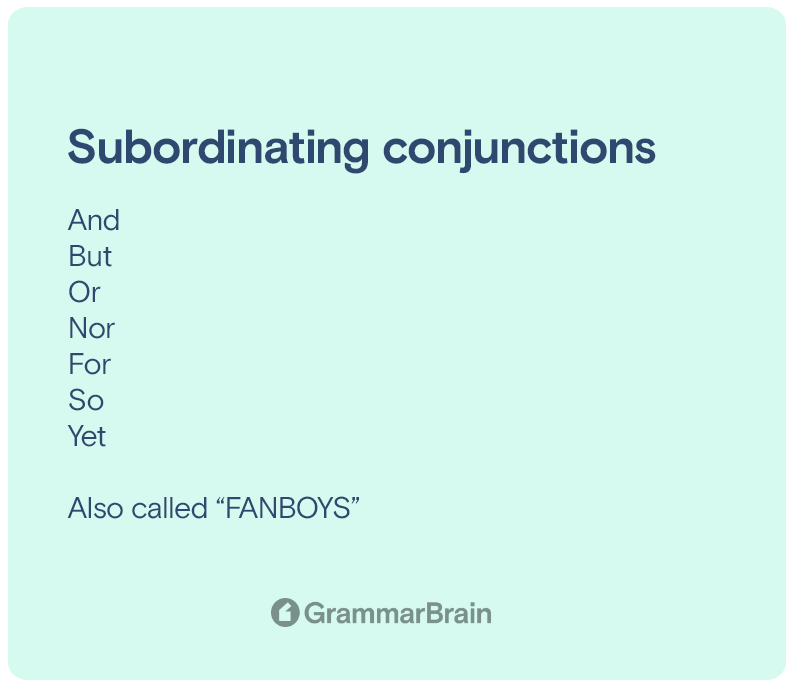Can you start a sentence with “and?” Most individuals believe there is a “rule” of grammar that states that sentences cannot begin with the word “and“. This is true for the word “and“, and other conjunctions as well, like “but”, for instance. In reality, such a rule has no basis.
So, the question arises, “Can you start a sentence with “and”? Yes, it’s possible.
“And” and its use in grammar
It should be noted that the word “and” is called a conjunction in grammar. Conjunction, in the truest sense, is a word used to join two sentences.
Nonetheless, the use of the word “and” to begin a sentence may be applicable too. “And” is one of the words in English that is among the most commonly used. It serves as one of the seven coordinating conjunctions. These are used to link complex sentences in English. Regular use of the word “and”, as we know it, is made when two independent clauses link with each other:
So, invariably, the same question that is asked again is, “Can you start a sentence with “and”? in spite of what some “rule makers” of grammar may state, a lot of style guides encourage writers to use the word “and” at the beginning of a sentence.

When can you start a sentence with “and”?
There may be a range of circumstances in which “and” is used to begin a sentence. In case a point has to be made, stressed upon, or emphasized, “and” is used to create the effect of drama. Note the following sentences:
- They tried every stunt, tip, and strategy in the book. And they lost the match!
- The painting has shades of red, blue, and yellow and this makes it look colorful. And it is painted by Souza!
Consider a caveat
While there may be a debate in any writer’s mind whether anyone can start a sentence with “and”, there are some considerations. It is important to note that a sentence that is complete contains a subject and a predicate.
Any group of words that does not have both these, is considered a fragment of a sentence and not a whole sentence.
Sentence fragments are often used, but these are grammatical mistakes. Errors in grammar occur when “and” is used in a sentence fragment.
Note the examples below:
- This is a complete sentence – The forest was eerie and dark. And I think I saw someone flying on a broom!
- This is a fragment of a sentence – The play has several famous actors. And some who are not known.
Examples of sentences starting with “And”
In the following examples, the use of “and” to start a sentence is shown:
- You can feel afraid sometimes. And that is alright.
- My friend is a true survivor. And she inspires others to work hard.
- The presenter announced another postponement of the news. And the response was what everyone expected.
Use “And” with care
It is possible to use “and” at the beginning of a sentence, provided it is used with special care. Furthermore, it is not used repeatedly at the start of a sentence, so limited use is permitted in most texts, with certain unspoken rules attached.
Other subordinating conjunctions (FANBOYS)
Here are the other subordinating conjunctions in the English language:
| And |
| But |
| Or |
| Nor |
| For |
| So |
| Yet |

FAQs
1. Is there a rule in English that claims you cannot begin a sentence with “and”?
There is no such rule that states that you cannot begin a sentence in English with the word, “and”.
2. When is the time that you can use “and” to begin a sentence in English?
It is possible to use the word “and” if a dramatic effect is to be created when you write.
Sources
- Can a Sentence Start with ‘And’? | Words “Not” to Start Sentences With | Merriam-Webster
- Can You Start a Sentence with a Conjunction? | Grammarly
- Starting a Sentence with “And” or “But” – Should You Do It? (prowritingaid.com)
- Can You Start A Sentence With “And”? | Thesaurus.com
Inside this article
Fact checked:
Content is rigorously reviewed by a team of qualified and experienced fact checkers. Fact checkers review articles for factual accuracy, relevance, and timeliness. Learn more.
Core lessons
Glossary
- Abstract Noun
- Accusative Case
- Anecdote
- Antonym
- Active Sentence
- Adverb
- Adjective
- Allegory
- Alliteration
- Adjective Clause
- Adjective Phrase
- Ampersand
- Anastrophe
- Adverbial Clause
- Appositive Phrase
- Clause
- Compound Adjective
- Complex Sentence
- Compound Words
- Compound Predicate
- Common Noun
- Comparative Adjective
- Comparative and Superlative
- Compound Noun
- Compound Subject
- Compound Sentence
- Copular Verb
- Collective Noun
- Colloquialism
- Conciseness
- Consonance
- Conditional
- Concrete Noun
- Conjunction
- Conjugation
- Conditional Sentence
- Comma Splice
- Correlative Conjunction
- Coordinating Conjunction
- Coordinate Adjective
- Cumulative Adjective
- Dative Case
- Determiner
- Declarative Sentence
- Declarative Statement
- Direct Object Pronoun
- Direct Object
- Diction
- Diphthong
- Dangling Modifier
- Demonstrative Pronoun
- Demonstrative Adjective
- Direct Characterization
- Definite Article
- Doublespeak
- False Dilemma Fallacy
- Future Perfect Progressive
- Future Simple
- Future Perfect Continuous
- Future Perfect
- First Conditional
- Irregular Adjective
- Irregular Verb
- Imperative Sentence
- Indefinite Article
- Intransitive Verb
- Introductory Phrase
- Indefinite Pronoun
- Indirect Characterization
- Interrogative Sentence
- Intensive Pronoun
- Inanimate Object
- Indefinite Tense
- Infinitive Phrase
- Interjection
- Intensifier
- Infinitive
- Indicative Mood
- Participle
- Parallelism
- Prepositional Phrase
- Past Simple Tense
- Past Continuous Tense
- Past Perfect Tense
- Past Progressive Tense
- Present Simple Tense
- Present Perfect Tense
- Personal Pronoun
- Personification
- Persuasive Writing
- Parallel Structure
- Phrasal Verb
- Predicate Adjective
- Predicate Nominative
- Phonetic Language
- Plural Noun
- Punctuation
- Punctuation Marks
- Preposition
- Preposition of Place
- Parts of Speech
- Possessive Adjective
- Possessive Determiner
- Possessive Case
- Possessive Noun
- Proper Adjective
- Proper Noun
- Present Participle
- Prefix
- Predicate



